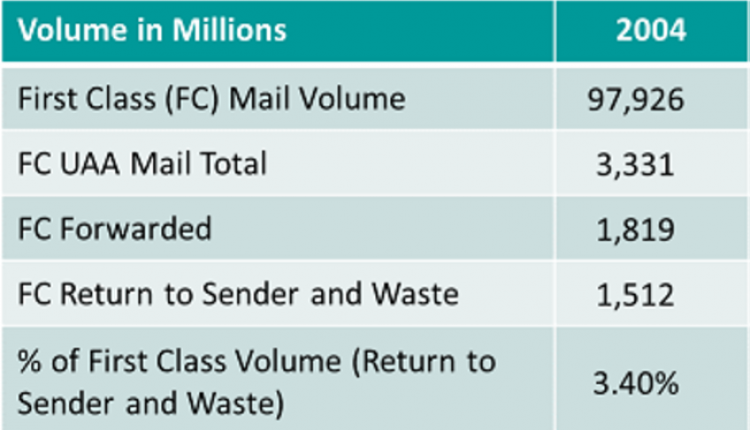While watching the Academy Awards ceremony, I was struck that the film industry (Hollywood, for short) and the Postal Service have something in common. They seem stuck in the past. These two industries can't shake their nostalgia for a bygone golden era. In the case of Hollywood, it seems filmmakers and the "industry" as a whole don't want to let go of their storied past, even as filmgoers send clear signals that are embracing the future, which includes watching movies at home, or anywhere and anytime on their handheld devices.
For the Postal Service and the mailing industry, this nostalgia is a little different. It's not the Postal Service that is clinging to the past; it is politicians - taking their cues from constituents (which include workers and customers) -- that seem to want to freeze the Postal Service in time. The Postal Service itself is anxious to move into the 21st Century, as evidenced by its five-year business plan and ongoing efforts to shrink its physical footprint and downsize its workforce. With its proposal to eliminate Saturday delivery and change its service standards, the Postal Service is saying, quite boldly, that this is no longer the 1990s (never mind the 1950s). Its recent plans and proposals underscore its realization that it needs to be a leaner, smaller delivery entity. It cannot afford excess capacity in an era of declining mail volume. It's also time to put the retail outlets where the people are, such as where we go shopping or where we do our banking and other errands. More and more frequently, Americans are shopping at home from a computer, or on the go from a mobile phone or smart device, such as an iPad or Nook. It makes sense for the Postal Service to sell its retail services online as well.
But each time the Postal Service takes small steps into the future, it gets yanked back into the past. Lawmakers have railed against the Postal Service's plans to close more than 200 processing facilities because it means a loss of jobs. And it seems any attempt to close low-activity post offices, no matter how small, elicits a public outcry about the loss of a town's identity and sense of community. It is sad to see rural American towns disappear and the post office as a community hub is certainly a part of our country's rich history. But we can't anchor the Postal Service in the past and expect to survive into the future. No other industry clings to its history at the risk of its current survival. Look at Verizon. It didn't fight to save landlines as a cultural institution dear to our nation's history; it jumped into the cellular phone and fiber optic businesses. Even Hollywood is discovering that it needs to adapt to a fickle viewing public that no longer seems interested in shelling out $11 to watch a special-effects laden movie on at a theater.
I have read a lot of commentary on the Postal Service over the past few years and much of it poses serious and difficult questions about what a future postal system should look like in this age of communications and instant information. It certainly isn't easy to bring a hardcopy delivery infrastructure into the digital age with so many stakeholders presenting different ideas. But I think there is a very simple and straightforward question we haven't asked that we need to: Is the Postal Service a jobs program? If the answer is yes, then perhaps we need to rethink the entire business plan with this in mind. And maybe Congress needs to pony up some stimulus funds. But if the answer is no, the Postal Service is not a jobs program, then we need to let the organization right-size its physical and human infrastructure for the current and future mail needs of this country.
Once we have that leaner Postal Service, we then need to figure out what its universal service obligation should be in the digital age. It may not make sense to deliver mail six days a week, to the door, as Americans rely more heavily on other forms of communication. It might also mean that that universal service includes digital services from our nation's postal system, such as the Postal Service providing an email address tied to the physical address. Just like the Postal Service itself, the universal service obligation was not meant to be static but to evolve as the nation's communications needs change. Let's not mire the Postal Service so far in the past that it never gets to experience its future.
For the Postal Service and the mailing industry, this nostalgia is a little different. It's not the Postal Service that is clinging to the past; it is politicians - taking their cues from constituents (which include workers and customers) -- that seem to want to freeze the Postal Service in time. The Postal Service itself is anxious to move into the 21st Century, as evidenced by its five-year business plan and ongoing efforts to shrink its physical footprint and downsize its workforce. With its proposal to eliminate Saturday delivery and change its service standards, the Postal Service is saying, quite boldly, that this is no longer the 1990s (never mind the 1950s). Its recent plans and proposals underscore its realization that it needs to be a leaner, smaller delivery entity. It cannot afford excess capacity in an era of declining mail volume. It's also time to put the retail outlets where the people are, such as where we go shopping or where we do our banking and other errands. More and more frequently, Americans are shopping at home from a computer, or on the go from a mobile phone or smart device, such as an iPad or Nook. It makes sense for the Postal Service to sell its retail services online as well.
But each time the Postal Service takes small steps into the future, it gets yanked back into the past. Lawmakers have railed against the Postal Service's plans to close more than 200 processing facilities because it means a loss of jobs. And it seems any attempt to close low-activity post offices, no matter how small, elicits a public outcry about the loss of a town's identity and sense of community. It is sad to see rural American towns disappear and the post office as a community hub is certainly a part of our country's rich history. But we can't anchor the Postal Service in the past and expect to survive into the future. No other industry clings to its history at the risk of its current survival. Look at Verizon. It didn't fight to save landlines as a cultural institution dear to our nation's history; it jumped into the cellular phone and fiber optic businesses. Even Hollywood is discovering that it needs to adapt to a fickle viewing public that no longer seems interested in shelling out $11 to watch a special-effects laden movie on at a theater.
I have read a lot of commentary on the Postal Service over the past few years and much of it poses serious and difficult questions about what a future postal system should look like in this age of communications and instant information. It certainly isn't easy to bring a hardcopy delivery infrastructure into the digital age with so many stakeholders presenting different ideas. But I think there is a very simple and straightforward question we haven't asked that we need to: Is the Postal Service a jobs program? If the answer is yes, then perhaps we need to rethink the entire business plan with this in mind. And maybe Congress needs to pony up some stimulus funds. But if the answer is no, the Postal Service is not a jobs program, then we need to let the organization right-size its physical and human infrastructure for the current and future mail needs of this country.
Once we have that leaner Postal Service, we then need to figure out what its universal service obligation should be in the digital age. It may not make sense to deliver mail six days a week, to the door, as Americans rely more heavily on other forms of communication. It might also mean that that universal service includes digital services from our nation's postal system, such as the Postal Service providing an email address tied to the physical address. Just like the Postal Service itself, the universal service obligation was not meant to be static but to evolve as the nation's communications needs change. Let's not mire the Postal Service so far in the past that it never gets to experience its future.





